Nuclear industry urged 'take advantage of window of opportunity'
08 September 2023
The current favourable attitude of many policymakers, much of the public, and the financial community means that the nuclear industry "needs to have the courage, be brave and believe in what we are doing" the closing session of World Nuclear Symposium 2023 was told.
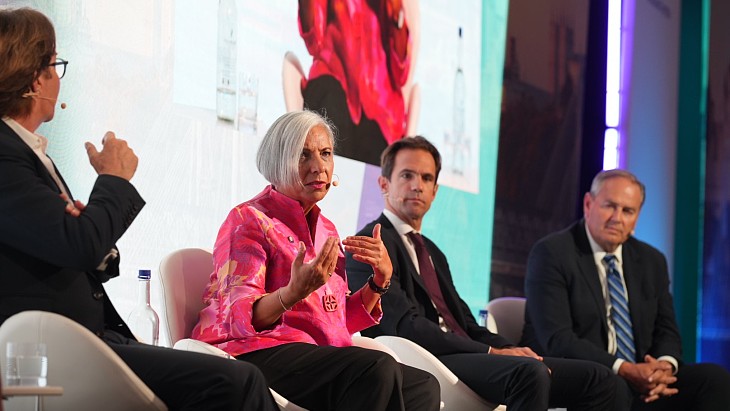 Rumina Velshi, centre, with Thomas Branche and Tim Gitzel, right (Image: World Nuclear Association)
Rumina Velshi, centre, with Thomas Branche and Tim Gitzel, right (Image: World Nuclear Association)Cameco CEO and President Tim Gitzel said that the need to tackle climate change had provided tailwinds for nuclear in recent years, with energy security now also driving the positive setting for the nuclear industry, saying "we have a good product, the window is open and we have to deliver ... let's get going".
Rumina Velshi, President and CEO, Canadian Nuclear Safety Commission, said that continuing collaboration was key within the industry and between regulators. She said that scale and speed were needed, to match the sense of urgency people have about needing to tackle climate change.
Sophie MacFarlane-Smith, Head of Customer Engagement, Rolls-Royce SMR, said the "drive, not just for Net Zero, but also energy security is massive" but she warned there was still a cautiousness in government and so "we need to do what we say ... deliver on our promises, not over-promise", so government, other stakeholders and the public know that "nuclear can be trusted to deliver and nuclear can make a real contribution to the fight against climate change and energy security".
Thomas Branche, Executive Vice President, Assystem, said that things had moved on from five years ago when the wish would have been for a clear vision from governments. He said it was time to be "construction-oriented". He also highlighted that there were different issues and attitudes in different countries, but it was always important to get support from people living in the locality of proposed sites.
Architect Erick van Egeraat urged the nuclear industry to not see itself as a special case, saying that he had worked on many large-scale projects, and said it was the nature of them that they take a long time to deliver. He also noted that the aesthetics of a nuclear plant could help public acceptance.
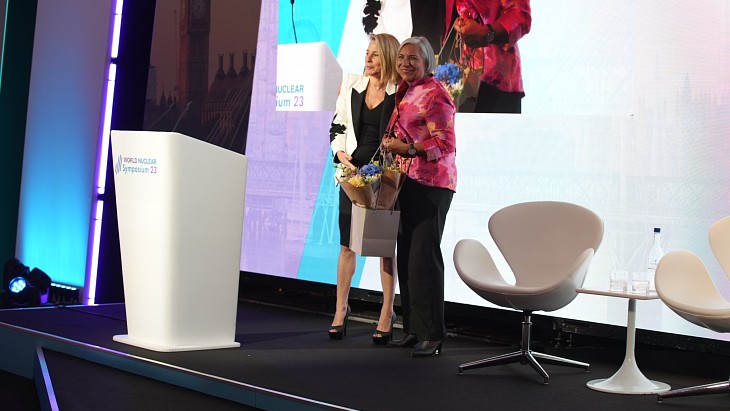
Sama Bilbao y León paid tribute to the contribution Rumina Valshi had made in her regulatory role as well as her broader championing of a better gender balance (Image: World Nuclear Association)
The session was the final one of the two day gathering of more than 700 people from the global nuclear sector, where the discussion has covered issues ranging from financing new nuclear, to how the industry will be able to recruit and train enough staff for the proposed expansion of nuclear energy in the years ahead.
To close World Nuclear Symposium, World Nuclear Association Director General Sama Bilbao y León said "we have the recognition of the policymakers, we have the attention of the finance community - now we are ready to get our act together and deliver ... and make the most of the huge opportunity that we have".
The challenge of recruiting a rapidly growing nuclear workforce
08 September 2023
The planned expansion of nuclear energy across the world means many more workers will be needed in the sector. Panellists at World Nuclear Symposium gave their views on the best ways to recruit staff, and a new mentoring initiative was announced.
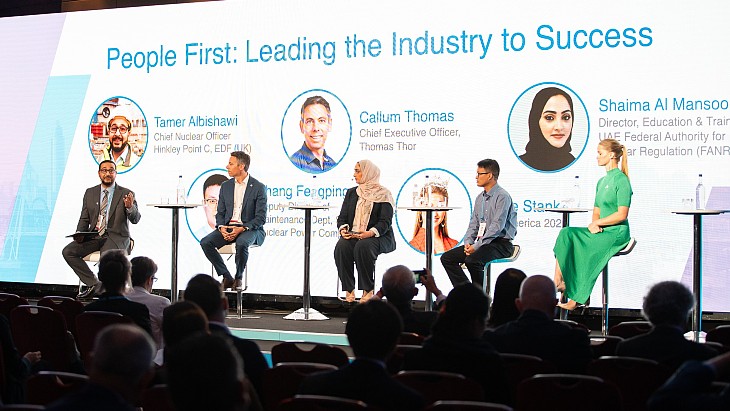 (Image: World Nuclear Association)
(Image: World Nuclear Association)
The session heard from moderator, Tamer Albishawi, chief nuclear officer at Hinkley Point C in the UK, that a recent report had forecast that the current 64,000-strong nuclear workforce in the UK would need to more than treble to around 200,000 people in the next five years. "So there is a gap, and my honest opinion is that maybe there is a bigger gap than some of us can see," he said.
Shaima Al Mansoori, director, Education & Training, UAE Federal Authority for Nuclear Regulation (FANR), said there was a similar picture in other countries reflecting a need to expand recruitment across the world. She broke down the competencies into three categories beyond general attributes - such as integrity - that would be wanted from all recruits. The three categories were firstly, the generic skills from university graduates, the second was specialisation within the nuclear-related field, for example in the regulatory field. The final category, which might not yet be for large numbers, but which are required now, are skills related to new types of reactors and small modular reactors with "most countries going in that direction".
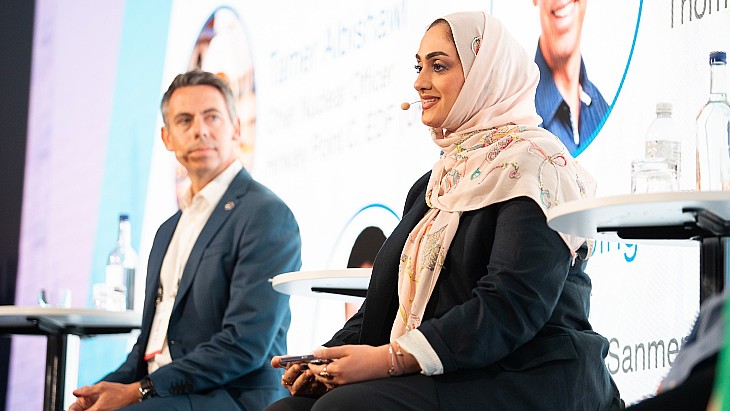
Shaima Al Mansoori, right, and Callum Thomas (Image: World Nuclear Association)
Callum Thomas, the founder and CEO of Thomas Thor Associates, a recruitment, executive search and HR consulting organisation for the nuclear industry, said a one-size-fits-all recruitment policy did not work and "you need to look at different target audiences ... looking at what motivates people". For example, he said, people beginning their career were especially motivated "by the purpose, meaningfulness of the industry, so with nuclear, they resonate really strongly with climate change and energy security". With mid-career people flexibility - in terms of location and hours, especially since the pandemic - was often important, while the "fairly new" late-career demographic of people who could have retired, often place extra value on the flexibility to work part-time while also being motivated by the idea of making a meaningful contribution.
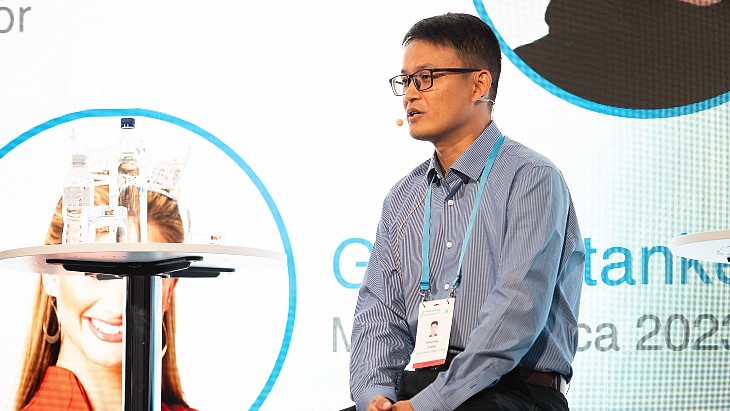
Zhang Fengping (Image: World Nuclear Association)
Zhang Fengping, Deputy Director of the Maintenance Department, Sanmen Nuclear Power Company, said that in China there were currently 24 units under construction with 6 to 8 units set to be approved per year in the next decade so there will be a continuing large demand for more human resources in the years ahead. He highlighted the use of emerging technology - such as automation and automated wireless radiation monitoring - and how it could bring extra safety and efficiency. He added that there was a focus on training and retraining with the new technologies and he did not see it as being a problem for the modern generation.
Grace Stanke, who is a nuclear engineering student and, as Miss America 2023, has been an advocate for nuclear, said that emerging technologies "add that excitement and that interest" for younger people who "just want to do good, they want to do better - I think the resounding theme is that we're very mission-oriented ... one of the most important things to me is what does that company actually do? What is the end goal? How are they making the world a better place?
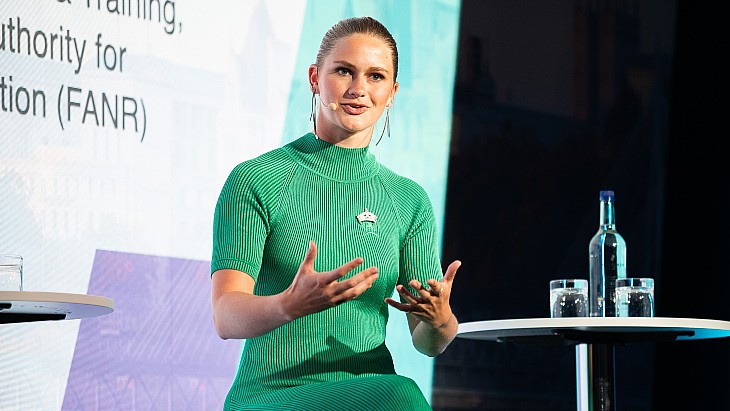
Grace Stanke gave the views of young people considering career options (Image: World Nuclear Association)
Albishawi recalled that when he had joined the industry he was told that it was a "job for life ... but now if you said that, I think it would scare people". Fellow panelists agreed, with Stanke saying that her contemporaries going through recruitment processes now do not want to become "just another cog, they want to be heard and listened to".
The session also saw the announcement of a new global mentoring initiative which is due to be formally launched by Women in Nuclear Global (WIN-Global) in November. Thomas said that it was open to everyone in the sector, regardless of level or gender, and "this is a first call to the industry to attract mentors and mentees". Anyone interested can sign up to become a WIN-Global member, for free, and will be sent information on the mentoring programme.
Researched and written by World Nuclear News
No comments:
Post a Comment